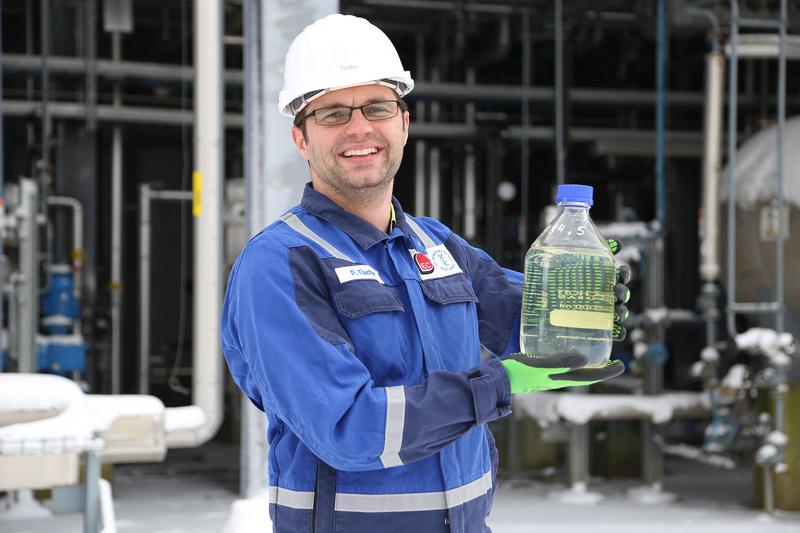

Paul Tischer from the IEC with a small container of CO2-neutral petrol
Photo: TU Bergakademie Freiberg
The process was developed jointly with Freiberg researchers at Chemieanlagenbau Chemnitz (CAC). Synthetic petrol is produced from methanol. Biomethanol, i.e. green methanol, was used for the first time.
In the future, this can be produced either from carbon dioxide, electricity and water alone or from previously burnt waste and regeneratively produced hydrogen – completely without fossil fuels. This enables almost CO2-neutral production compared to previous alternatives.
The conversion of methanol to petrol was tested at the Institute for Energy Process Engineering and Chemical Engineering (IEC) of the TU Bergakademie Freiberg.
The institute's own demonstration plant is, by the way, the only gasoline synthesis plant of technical size outside China that can supply fuel quantities for vehicle fleet tests. The produced high-octane gasoline is now going to be tested by automobile manufacturers.
In addition to the main goal of reducing CO2 emissions, the great advantage of synthetically produced gasoline is that it enables automobile manufacturers to further develop their combustion engines, that clean gasoline can be used in a downward-compatible manner for the existing fleet of automobiles, and that it is also available nationwide via the existing network of filling stations.
“This shows once again the success of Freiberg research. We have a pioneering role here. We are the only ones who are already able to produce large quantities of CO2-neutral petrol. Nevertheless, there is still a lot to be done before we get 'Freiberger CO2-free' at the filling station,” explains Prof. Bernd Meyer, head of the IEC.
In the coming months, the scientists at the IEC will analyse synthesis processes and test results comprehensively in order to optimise the process parameters and work on the development and testing of advanced catalysts for future fuels.
A second trial at the plant is already planned for 2020, in which a further 15 to 25 m3 of green gasoline will be produced.
The research and development work is funded by the Federal Ministry of Economics and Energy as part of the “C3 Mobility” research project.
Prof. Dr. Bernd Meyer, Phone: +49 (0)3731 39-4511; Mail: Bernd.Meyer@iec.tu-freiberg.de
https://tu-freiberg.de/en/iec/evt/groups/syngas-technologies-st (Group Syngas Technologies at TU Freiberg)
http://www.c3-mobility.de/en/home/ (research project C3 Mobility)












